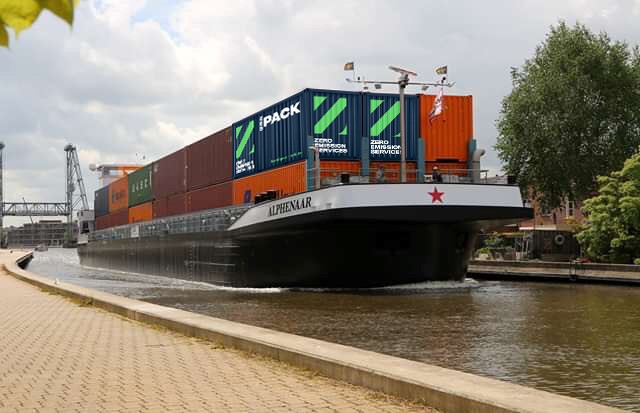
2 June 2020 saw the launch of Zero Emission Services B.V. (ZES), a new company that helps increase the sustainability of the inland shipping sector by leasing exchangeable battery containers — known as ZES-Packs — to businesses in inland shipping.
ZES partners are committed to promoting emissions-free operations for inland waterway transport. Image Courtesy ZES.
ZES was formed by a consortium of the Port of Rotterdam, technology group Wärtsilä, ING Bank, and energy and technical service provider Engie. The concept is supported by the Dutch Ministry of Infrastructure and Water Management.
Within the Netherlands transport sector, inland navigation accounts for 5 per cent of carbon dioxide (CO2) emissions. By switching from diesel-fuelled propulsion to fully electrically powered transport, an important step can be taken towards realising the Paris Climate Agreement goals.
Specifically, the concept is based on the use of replaceable battery containers. These will be charged using energy from renewable sources. A network of open access charging points will be set up for exchanging depleted battery containers for ready-charged replacements, thereby keeping waiting time to a minimum. The ZESPacks are designed for multiple applications, enabling them to be utilised for temporary onshore use, such as stabilising the local electricity grid or meeting short-term demand for electrical power.
The network of charging stations will be gradually expanded to form a national grid of approximately 20 charge points. An inland vessel can travel some 50 to 100 km on two charged ZES-Packs – depending, among other factors, on the currents and the vessel’s size and draught.
The system is future-proof since it is independent of the energy provider. Initially, batteries will be employed but should, for example, hydrogen become a viable alternative at some point, containers equipped with hydrogen technology could supply power in the same way.
To make it easier for barge operators to sign-on to the concept, a ‘pay-per-use’ financing model has been developed. In this way, ZES charges only for the cost of consumed renewable energy plus a rental fee for the battery container, so the skipper’s operating costs remain competitive. However, vessels must be equipped with an electric propulsion line.
Each container ship that switches from diesel fuel to ZES-Packs can reduce its carbon emissions by 1,000 tonnes per year. In addition, these battery-powered vessels do not release any particulates or nitrogen into the atmosphere, the partners said in a joint press release.
The project will initially be employed along the Zoeterwoude – Alpherium – Moerdijk corridor. Following this, it will be expanded to include the Amsterdam – Rotterdam – Antwerp corridor, making a connection to Nijmegen. The emphasis during the initial stage will be on converted and newly-built container carriers.
The Heineken beer company has entered into an agreement with ZES to utilise the service for transporting beer, thus becoming the first end customer for the enterprise. This year, the first ship fitted with ZES-Packs, De Alphenaar, will already be carrying beer from the Heineken brewery in Alphen aan de Rijn to the port of Moerdijk. This first vessel will be joined by another five over the course of 2021.
The post ZES partners develop emission-free barge concept appeared first on Offshore Energy.
Source: LNG World News
